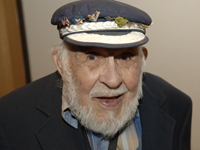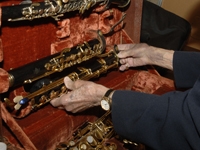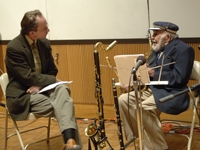
Al Gallodoro
In many ways, musician Al Gallodoro embodies all that is jazz. As a historian, Gallodoro has seen nearly all of it: from his rambling youth in the clubs and theaters of New Orleans, through the golden age of Big Band jazz in 1930s New York City, and up to the present day as a college music professor and regular performer. Invited to Weill Medical College by the Humanities and Medicine Program, the Division of Geriatrics and the medical student Geriatric Interest Group, Gallodoro showed that he still knows how to swing and incorporate a little improvisation into life during a concert on April 3 in Uris Auditorium.
Gallodoro approaches his age with a certain whimsy ("I've got a fantastic memory. Lately I can't remember what happened yesterday"), and shuffling onto the auditorium stage with his alto sax, clarinet, and bass clarinet, he looks every bit the diminutive, grandfatherly man one might expect for a 93-year-old. But it quickly becomes clear that he is razor sharp, recalling details of his teenage years playing with the Orpheum Theater orchestra in New Orleans and, later on, his time working with orchestra leader Paul Whiteman in the '30s and '40s.

When he plays, his music is bright and beautiful; when he wants it to be, it can be dizzyingly fast. His right foot taps methodically, keeping time, until he approaches a particularly sweet passage, when he bends slightly forward, closes his eyes and fills the auditorium with music.
This lifelong love of music is at the core of a kind of musical feedback mechanism that seems central to Gallodoro's longevity: the more he plays, the longer he lives, and that only gives him more time to play.
"What keeps him going is his passion, his music," said Joann Chmielowski, his accompanist for the last eight years. "He is always coming up with more and more ideas. That is the key to his longevity." she said.
According to Dr. Cary Reid, the Joachim Silbermann Family Clinical Scholar in Geriatric Palliative Care at the Medical College, the idea has solid scientific backing. "There is ample evidence that older adults who participate in hobbies have a better quality of life and that engaging in hobbies also reduces a person's risk for developing depression in late life," Dr. Reid said.

Dr. Cary Reid and Al Gallodoro
Gallodoro's ability to fill an auditorium, or play an extended 16th-note run in one breath, may have played a significant hand in Gallodoro's relatively brief two-day hospital stay after congestive heart failure recently.
"The reason I think he was out so quickly was because of his lung capacity," said Chmielowski. "Right away, he was like 'What's next, what else can I be doing?'"
Physical activity-blowing the bass clarinet or an afternoon walk-can also have a noticeable impact on longevity. "There is data to support the idea that leisure activities that encompass some form of physical activity are life extending," Dr. Reid said. What is most noticeable about Gallodoro is not so much a refusal to live a typical lifestyle, although he hasn't. Rather, he seems to believe that there is simply more life to be lived, more music to be played. "Only the coffin will retire me. I'll play until I can't play anymore," he said.
He followed this sentiment with "Stompin' at the Savoy," and a pair of impromptu demonstrations on the range and depth of the bass clarinet. After 80 years around horns, he still marveled how the instrument could boom to the back of the room, or whisper almost inaudibly. "Sort of like me," he chuckled.
Photos by Amelia Panico.

